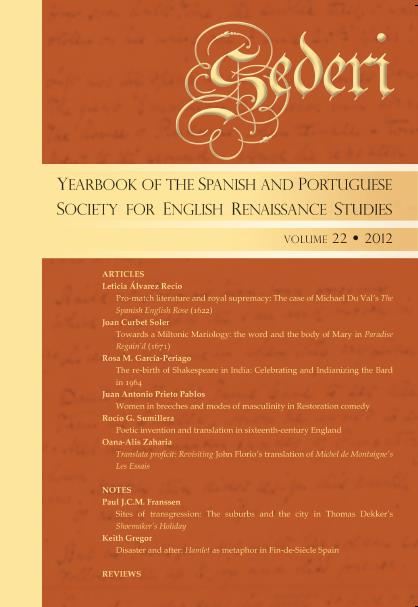The re-birth of Shakespeare in India: Celebrating and Indianizing the Bard in 1964
Keywords:
Shakespeare, appropriation, theatre performances, Quartercentenary, IndiaAbstract
While the Tercentenary of Shakespeare’s death (1916) was hardly celebrated in India and marked the beginning of a period in which Shakespeare was hidden, the Quartercentenary of his birth (1964) spawned a large number of collections, theatre performances and even exhibitions to pay homage to the Bard. Although a special issue of the journal Indian Literature published in 1964 contributed to the re-emergence of Shakespeare, the most revolutionary projects in the making of a vernacular Shakespeare occurred on the Indian stage via Utpal Dutt’s Shakespearean productions in Bengali. Following Arjun Appadurai, this paper argues that Utpal Dutt’s Bengali theatre productions in 1964 participate in a “decolonization” of Shakespeare, consisting in liberating Shakespeare “the text” and Shakespeare “the author” from the bonds of the empire, from restrictive colonial associations. Two out of his three theatre performances produced in 1964 – Romeo and Juliet and Julius Caesar – are symptomatic of the effects of “glocalizing” the Shakespearean texts since the original place names and names of the characters are combined with the Bengali language and unavoidable localization.
Downloads
Downloads
Published
Issue
Section
License
The copyright holder of the published contributions is SEDERI.The hardcopy and an open-access version of the journal will be published simultaneously. The issues will be available online in the SEDERI website (http://www.sederi.org/yearbook/) and other repositories that have signed an agreement with SEDERI.
The authors who publish with this journal agree to the following terms:
a) SEDERI retains copyright of the essay.
b) If the author wishes to republish or rewrite the essay for another journal, or include the essay published in SEDERI in their personal repositories, or in any other way, they should contact the editors to obtain permission to do so. This will entail citing SEDERI as the original source and sending the editors a copy of the new version, or the link to the website, in case of online publishing.
The author(s) hereby warrant(s) that:
a) The essay submitted for publication is an original creation and does not infringe any copyright or property right of another journal, author or publisher.
b) The essay submitted for publication has not been previously published, whole or in part, and is not being considered for publication elsewhere.
c) Written permission has been obtained for any material from other sources included in the essay submitted for publication.




